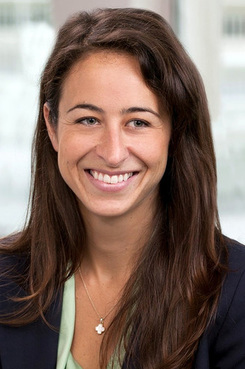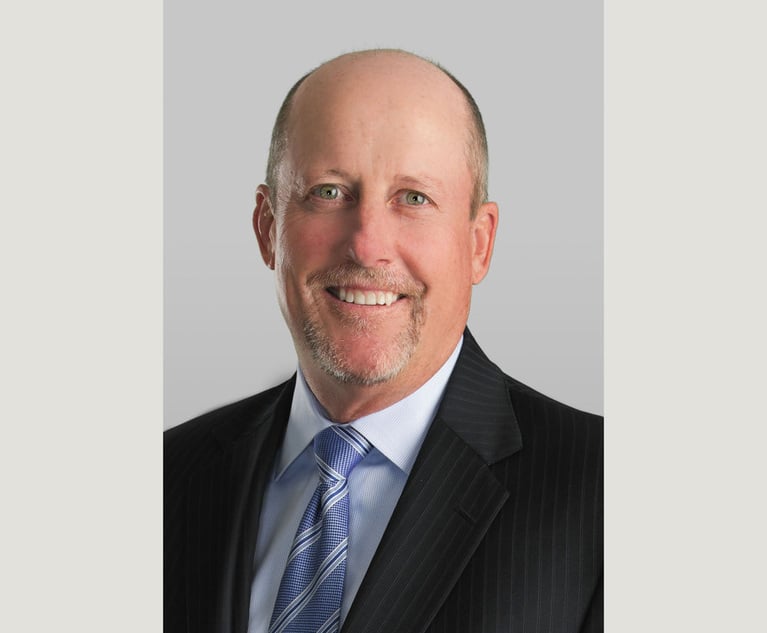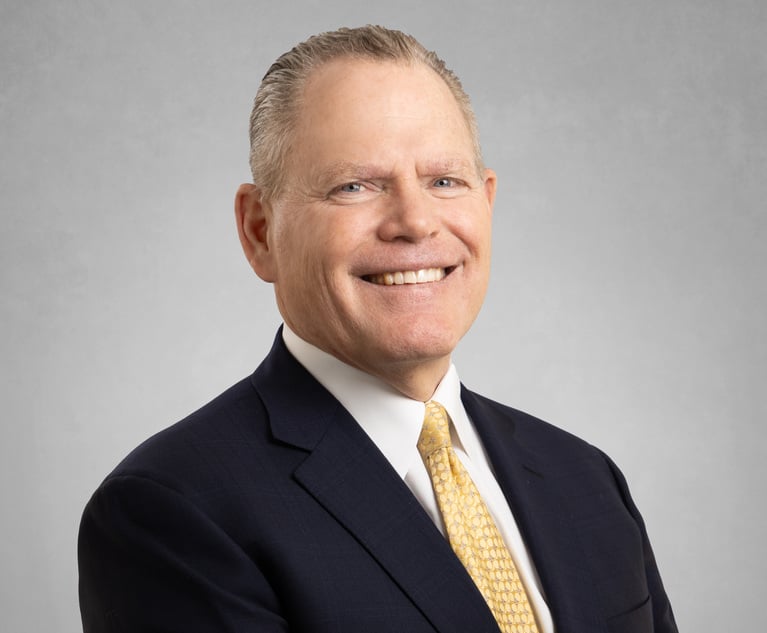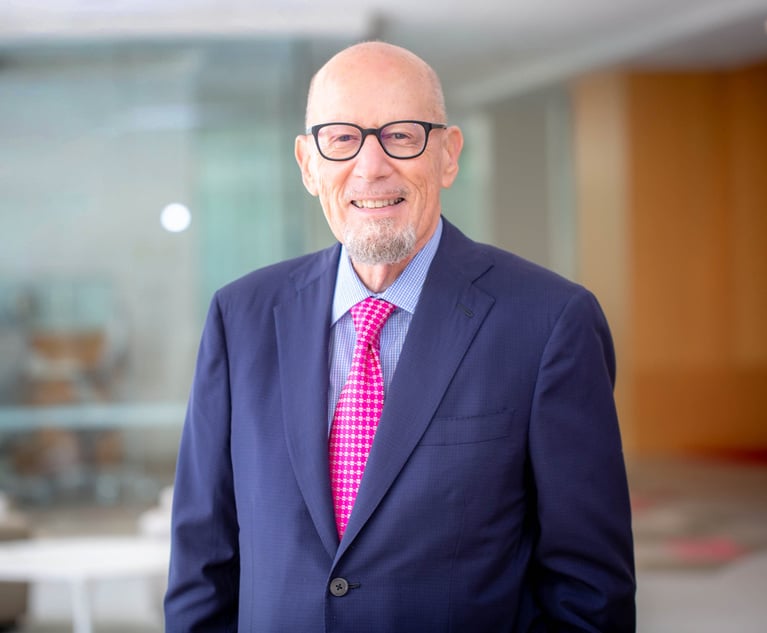How I Made Partner: Latham & Watkins' Erin Brown Jones
"If something feels weird, it's probably the wrong approach for you. Being yourself resonates with clients. It helps you develop real long-lasting connections."
August 22, 2019 at 11:22 AM
6 minute read
Erin Brown Jones, 36, Latham & Watkins
Office: Washington, D.C.
Practice area: White-collar defense and investigations.
Law school and year of graduation: Notre Dame Law School, 2010.
How long have you been at the firm? Since October 2010 (2009 summer associate).
How long were you an associate at the firm? Eight years.
Were you an associate at another firm before joining your present firm? No.
What year did you make partner at your current firm? January 2019.
What's the biggest surprise you experienced in becoming partner? I had always thought about partnership as a recognition of the firm's belief in me. I hadn't fully appreciated that this new title would have a similar meaning to our clients. Already in these first six months, I've learned that being a Latham partner confers credibility differently than it did when I was an associate. Even with new clients with whom I have no prior relationship, clients trust me to lead their matters and provide Latham-quality service. Hearing and seeing "partner" after my name also continues to surprise me. I recently tried to tell some of our summer associates that I was "just in their shoes." They politely reminded me that I was not. The time from my summer associate role in 2009 to being a partner today flew by.
 What do you think was the deciding point for the firm in making you partner? I don't think it was one moment or one project, but rather an eight-plus-year journey of integrating myself into the fabric of our firm, our office, and our practice. Starting as a young associate, I injected myself into the firm community—leading and initiating practice group trainings, serving on firm committees, mentoring junior associates, and raising my hand—a lot of raising my hand. By becoming a core member of the team, I was given great opportunities to stretch, to push myself, to gather up critical experiences and develop my practice. It doesn't mean they had an easy decision, but when it came time for the firm to make progression decisions, I had put myself in a situation where I was deeply embedded in the practice and they understood how I would fit into the partnership.
What do you think was the deciding point for the firm in making you partner? I don't think it was one moment or one project, but rather an eight-plus-year journey of integrating myself into the fabric of our firm, our office, and our practice. Starting as a young associate, I injected myself into the firm community—leading and initiating practice group trainings, serving on firm committees, mentoring junior associates, and raising my hand—a lot of raising my hand. By becoming a core member of the team, I was given great opportunities to stretch, to push myself, to gather up critical experiences and develop my practice. It doesn't mean they had an easy decision, but when it came time for the firm to make progression decisions, I had put myself in a situation where I was deeply embedded in the practice and they understood how I would fit into the partnership.
Describe how you feel about your career now that you've made partner. Calmer. The promotion process naturally involves anxiety and an elevated pace, so to be on the other side is a relief. Inspired. Our partnership is made up of such incredible attorneys (and role models of mine), and to now be part of this group is really special and motivating.
What's the key to successful business development in your opinion? Authenticity. If something feels weird, it's probably the wrong approach for you. Being yourself resonates with clients. It helps you develop real long-lasting connections and gives you the best opportunity to shine. Also, at a large firm like Latham, internal marketing is so important. Marketing yourself within the firm as a subject-matter expert, and someone who is willing to be a team player, jump in at the last minute, provide quality service to a new client, etc., will make you a deeply valuable and appreciated asset to your colleagues, leading to opportunities for business development and growth.
What's been the biggest change, day-to-day, in your routine since becoming partner? As a young female partner, I have more opportunities to serve as a mentor and leader and to participate in business development teams, all of which I enjoy and care about deeply. But finding time to fulfill these demands (while balancing client work and life outside the firm) can be a challenge, and is something I'm continuing to develop a routine around.
Who had the greatest influence in your career that helped propel you to partner? This feels like a bit of a trick question because for me it wasn't just having one champion or sponsor within the firm, but having a network of people who believed in me and supported me. These are people who found—and actively sought out—ways to promote my career and skill development. These conscious efforts by my mentors, supervisors, and department leaders were critical to developing the skills I needed to move forward through the promotion process, from throwing me out in the field as a junior associate, to finding first-chair, government-facing experiences, to asking clients to give me opportunities they knew I could handle. I simply would not have developed the skills and experiences I have today without very thoughtful efforts by a whole network of partners opening those doors for me.
It's also a trick question because the right answer is clearly my husband Scott, who also is a lawyer at Latham, and was promoted to counsel in our data privacy and security group the same day I was promoted to partner. (The vote to promote us was actually the same day as our four-year wedding anniversary!) Especially during the last few years running up to the promotion process, Scott was such a rock for me and our family. He fully understood the highs and lows of my job. (Empathy comes easy when you have the exact same job, but it also helped to know we were "in it together," since we were both going through the promotion process at the same time.) He took on more than his share of the parenting duties while I was on the road for investigations, business development, or firm matters. And, most importantly, he was a voice of confidence and calm through the promotion process. And while it didn't propel me to partner, carpooling to work together is also kind of nice.
What's the best piece of advice you could give an associate who wants to make partner? I have a little sign in my office that says "Work Hard and Be Nice." That might actually be the trick, although there are nuances to both pieces of advice.
Work Hard: The firm and our clients expect us to provide the highest quality service and work product. But hard work doesn't just mean a lot of hours or accomplishing the required tasks. It means working with focus and attention to detail, thinking creatively about solutions and strategy, and working efficiently by bringing to bear our experience and the Latham brain trust.
Be Nice: To me, the "be nice" part is about overall attitude. You have to have fun, you have to be an active participant in your firm and your practice group (be a "yes person"), and you have to build support around you—supervisors, supervisees, staff, clients, vendors, everybody. It's a demanding job, but it's infinitely better and more rewarding if you're enjoying the work and the people around you.
Got a suggestion for a new partner to profile? Email [email protected].
This content has been archived. It is available through our partners, LexisNexis® and Bloomberg Law.
To view this content, please continue to their sites.
Not a Lexis Subscriber?
Subscribe Now
Not a Bloomberg Law Subscriber?
Subscribe Now
NOT FOR REPRINT
© 2025 ALM Global, LLC, All Rights Reserved. Request academic re-use from www.copyright.com. All other uses, submit a request to [email protected]. For more information visit Asset & Logo Licensing.
You Might Like
View All
How I Made Managing Partner: 'Be the Uniting Voice of the Firm,' Says George Ogilvie of McDonald Carano

How I Made Managing Partner: 'Educate Yourself About Law Firm Economics,' Says Gregory Hessinger of Mitchell Silberberg

Cozen O'Connor's Bernard Nash Pioneered the Modern State AGs Practice. Now He's Hanging Up His Boots
6 minute readTrending Stories
- 1Uber Files RICO Suit Against Plaintiff-Side Firms Alleging Fraudulent Injury Claims
- 2The Law Firm Disrupted: Scrutinizing the Elephant More Than the Mouse
- 3Inherent Diminished Value Damages Unavailable to 3rd-Party Claimants, Court Says
- 4Pa. Defense Firm Sued by Client Over Ex-Eagles Player's $43.5M Med Mal Win
- 5Losses Mount at Morris Manning, but Departing Ex-Chair Stays Bullish About His Old Firm's Future
Who Got The Work
J. Brugh Lower of Gibbons has entered an appearance for industrial equipment supplier Devco Corporation in a pending trademark infringement lawsuit. The suit, accusing the defendant of selling knock-off Graco products, was filed Dec. 18 in New Jersey District Court by Rivkin Radler on behalf of Graco Inc. and Graco Minnesota. The case, assigned to U.S. District Judge Zahid N. Quraishi, is 3:24-cv-11294, Graco Inc. et al v. Devco Corporation.
Who Got The Work
Rebecca Maller-Stein and Kent A. Yalowitz of Arnold & Porter Kaye Scholer have entered their appearances for Hanaco Venture Capital and its executives, Lior Prosor and David Frankel, in a pending securities lawsuit. The action, filed on Dec. 24 in New York Southern District Court by Zell, Aron & Co. on behalf of Goldeneye Advisors, accuses the defendants of negligently and fraudulently managing the plaintiff's $1 million investment. The case, assigned to U.S. District Judge Vernon S. Broderick, is 1:24-cv-09918, Goldeneye Advisors, LLC v. Hanaco Venture Capital, Ltd. et al.
Who Got The Work
Attorneys from A&O Shearman has stepped in as defense counsel for Toronto-Dominion Bank and other defendants in a pending securities class action. The suit, filed Dec. 11 in New York Southern District Court by Bleichmar Fonti & Auld, accuses the defendants of concealing the bank's 'pervasive' deficiencies in regards to its compliance with the Bank Secrecy Act and the quality of its anti-money laundering controls. The case, assigned to U.S. District Judge Arun Subramanian, is 1:24-cv-09445, Gonzalez v. The Toronto-Dominion Bank et al.
Who Got The Work
Crown Castle International, a Pennsylvania company providing shared communications infrastructure, has turned to Luke D. Wolf of Gordon Rees Scully Mansukhani to fend off a pending breach-of-contract lawsuit. The court action, filed Nov. 25 in Michigan Eastern District Court by Hooper Hathaway PC on behalf of The Town Residences LLC, accuses Crown Castle of failing to transfer approximately $30,000 in utility payments from T-Mobile in breach of a roof-top lease and assignment agreement. The case, assigned to U.S. District Judge Susan K. Declercq, is 2:24-cv-13131, The Town Residences LLC v. T-Mobile US, Inc. et al.
Who Got The Work
Wilfred P. Coronato and Daniel M. Schwartz of McCarter & English have stepped in as defense counsel to Electrolux Home Products Inc. in a pending product liability lawsuit. The court action, filed Nov. 26 in New York Eastern District Court by Poulos Lopiccolo PC and Nagel Rice LLP on behalf of David Stern, alleges that the defendant's refrigerators’ drawers and shelving repeatedly break and fall apart within months after purchase. The case, assigned to U.S. District Judge Joan M. Azrack, is 2:24-cv-08204, Stern v. Electrolux Home Products, Inc.
Featured Firms
Law Offices of Gary Martin Hays & Associates, P.C.
(470) 294-1674
Law Offices of Mark E. Salomone
(857) 444-6468
Smith & Hassler
(713) 739-1250










